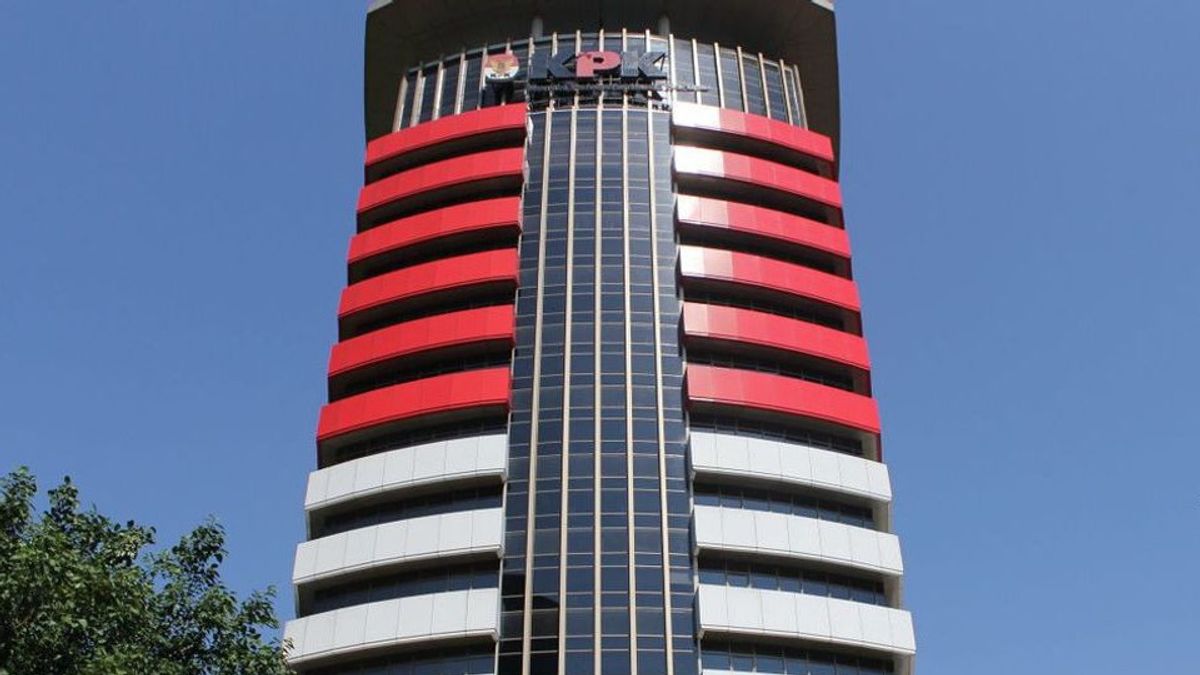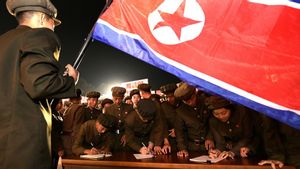JAKARTA - Indonesia's Corruption Perception Index score in 2020 has fallen by three points to 37 from a score of 40.
Apart from the score, Indonesia's ranking has also dropped from 85 to 102. This has prompted criticism from a number of anti-corruption activists in the country.
Transparency International Indonesia (TII) released the Corruption Perception Index on Thursday, January 28. TII Research Department Manager Wawan Suyatmiko said based on their research, Indonesia had decreased its score and lost to Malaysia and Timor Leste regarding this anti-graft index.
"Our CPI in 2020 is at a score of 37 with a ranking of 102. This score is down three points from 2019," said Wawan in his presentation posted on Transparency International Indonesia's Facebook account.
He then revealed, of the nine indicators of CPI's assessment, only one indicator had increased, namely the World Justice Project-Rule of Law Index. Meanwhile, three data sources have stagnated, namely the World Economic Forum Eos, the Bartelsmann Foundation Transform Index, and the Economist Intelligence Unit Country Ratings.
Meanwhile, those that experienced a decline were the International Country Risk Guide, Indonesia's MD World Competitiveness Yearbook, Global Insight Country Risk Ratings, Varieties of Democracy Projects, and the PERC Asia Risk Guide.
Then, Wawan explained that in the Southeast Asia region, with this score Indonesia was ranked fifth. Meanwhile, Singapore is in first place with a score of 85.
Furthermore, in second place there is Brunei Darussalam with a score of 60, Malaysia with a score of 51 and Timor Leste 40.
Then in sixth place there is Vietnam with a perception index score of 36, Thailand with a score of 26, the Philippines with a score of 34 and Laos with a score of 29. Myanmar with a score of 28 and the most distended is Cambodia with a score of 21.
Meanwhile, with 180 countries in the world and included in the research conducted by TII, Indonesia has the same score as Gambia.
After presenting this data, Wawan said that the achievement of Indonesia's GPA score experienced a turning point. Because, since 2008, Indonesia's IPK has often climbed and only stagnated several times.
Criticism also came with the results of this TII research. In the release event, former Deputy Chairman of the Corruption Eradication Commission (KPK) Laode M Syarif expressed his disappointment.
He said that this reduction should not be regarded as something ordinary, but should be addressed more wisely.
"We should not consider (this result, red) as something mediocre. Because in 2019 we get 40 and we come back. That means we are back in 2016, 37. So that's the past five years. So we don't think this is something mediocre. This is no longer a yellow light, but a red light, "said Laode in the same event.
In addition, he also mentioned that this kind of decline had never occurred in the previous year. "So who is responsible, yes that is the main stake holder," he said.
"Because the first one who is most vulnerable is political corruption, so it is represented at the top and corruption in the law enforcement sector, namely the police, KPK, prosecutors, Supreme Court, prisons, and others. And of course, all of our people," he added.
Criticism also came from former KPK spokesman Febri Diansyah. Through his Twitter account @febridiansyah, this anti-corruption activist said that the decline in Indonesia's corruption perception index from 40 to 37 in 2020 was a sad thing.
Based on the data presented by TII, he then asked the government and various groups to stop saying that they had succeeded in eradicating corruption.
"Hopefully the government and various related parties stop patting the chest saying they have succeeded in eradicating corruption or even saying that the KPK is fine amidst global assessments like this," he was quoted as saying on his Twitter account.
"It is better to be honest and this will become a mirror so that we all carry out a more serious evaluation," he added.
The Indonesia Corruption Watch (ICW) also responded with disappointment. ICW researcher Kurnia Ramadhana said that the decline was due to three reasons.
First, he said, this happened because of the unclear orientation of the government in formulating policies to eradicate corruption. Apart from the amendments to the KPK Law, he said, throughout 2020, the government and the DPR also enacted several regulations that prioritize oligarchs and ignore democratic values.
"For example, the Omnibus Law of the Job Creation Law. It is undeniable that the government and the DPR only accommodate elite interests in the framework of economic investment and ignore the importance of good governance," said Kurnia in his written statement.
Second, according to him, there is a failure in law enforcement reform in maximizing the prosecution of corruption cases. This conclusion is not without basis because referring to the KPK data, the number of prosecution has decreased drastically throughout 2020, starting from investigations, prosecutions, to important instruments such as hand arrest.
"However, this decline is understandable because of the change in law enforcement procedures which resulted in the law enforcement being blunt," said Kurnia.
The third is due to changes in the KPK's performance in eradicating corruption. Kurnia said, since Firli Bahuri, cs was inaugurated, the KPK has generated more controversy than it has shown achievements.
According to Kurnia, the decline in the work of the KPK cannot be separated from the political decisions of the government and the DPR in determining the current KPK commissioners. "Whereas the KPK has been one of the important pillars of corruption eradication which has supported Indonesia's CPI score increase," he said.
Although criticism came because of the decline in the Corruption Perception Index, President Joko Widodo (Jokowi) Spokesperson Fadjroel Rachman claimed that the president always strives to create a clean and anti-corruption government.
"Regarding the publication of the Corruption Perception Index 2020 by Transparency International, in essence, President Jokowi is firm in creating an anti-corruption government," said Fadjroel in his written statement.
He said Jokowi always asked ministries, institutions and all stake holders to prevent corruption. Not only that, the former governor of DKI Jakarta often reminds all parties to support the efforts of law enforcers.
"And support legal institutions to take action against perpetrators of corruption in accordance with regulations indiscriminately," he said.
Meanwhile, Acting KPK spokesman for Prevention Ipi Maryati actually assessed that the decline in Indonesia's IPK in 2020 is a sign that this country is perceived as not being serious in eradicating corruption.
"Indonesia is thus still perceived as a corrupt country. Indonesia can also be perceived as being relatively serious and inconsistent in its efforts to eradicate corruption," said Ipi.
So, with the lowering of the CPI, efforts to eradicate corruption must be a serious concern for all parties, not just the government. This is because the problem of corruption can not only be resolved with jargon and slogans but also real work and collaboration of all elements of the nation.
"Therefore, the eradication of corruption must not stop at the level of jargon or slogan. Likewise, the bureaucratic reform system should not stop at a mere slogan or administrative level," he said.
"Without collaborative action between the state and society, as well as all elements of the nation, corruption in Indonesia is difficult to overcome," he concluded.
The English, Chinese, Japanese, Arabic, and French versions are automatically generated by the AI. So there may still be inaccuracies in translating, please always see Indonesian as our main language. (system supported by DigitalSiber.id)








